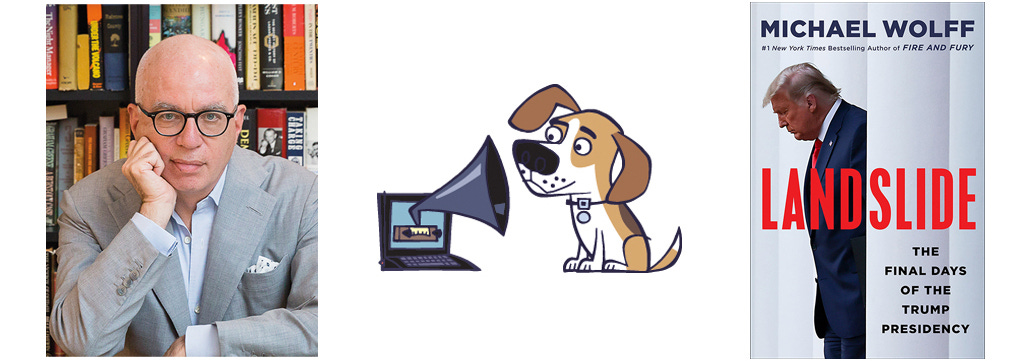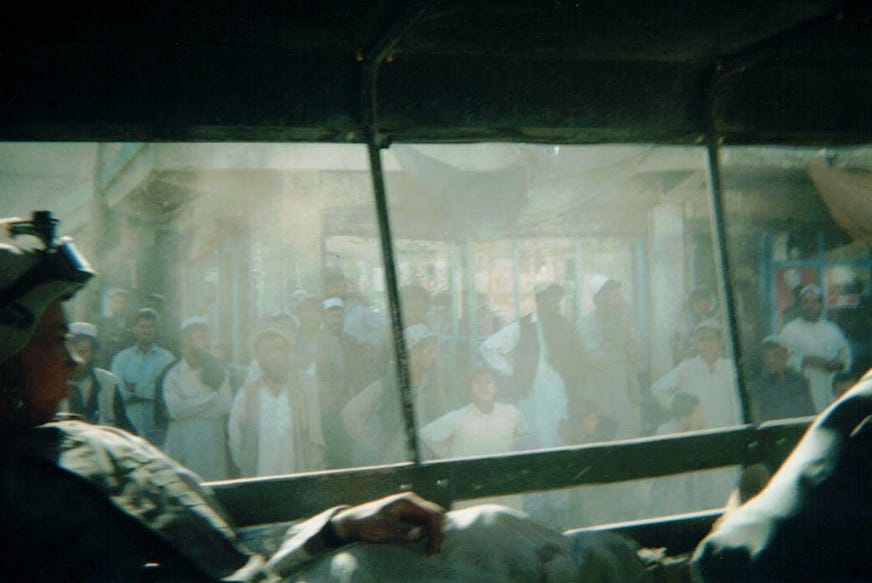Michael Wolff, a longtime media critic, and now the author of three Trump tell-alls, talks with me about the 45th president. How politically dangerous is he still? How delusional and mentally unbalanced? Will he run again? We get into it.
You can listen to our conversation right away in the audio player embedded above, or right below it you can click “Listen in podcast app” — which will connect you to the Dishcast feed. For two clips of the episode — on the questions of whether the media confronted Trump appropriately and whether the madman will return to electoral politics — head over to our YouTube page.
A reader writes:
Your two-week vacation gave me time to listen to the Michael Lewis episode. Since Donald Trump is supposedly responsible for all of the country’s ills, here’s a counterfactual: If he had taken the California approach to controlling Covid, would he have been branded an authoritarian dictator who was denying Americans their basic freedoms?
Had he taken that approach, along with Operation Warp Speed, I doubt he would have been hailed as someone who was doing his best to protect the public’s health. He knew how the media would portray an attempted federal shutdown of the country and his only response was to err on the side of less restrictions. Damned if you do, damned if you don’t.
I don’t disagree. That’s what a tribalized country does: one tribe cannot ever give a president of the other tribe the benefit of the doubt, even in a public health emergency. That applies to Biden now as well, of course.
Another reader swung his support to Trump out of a reaction to the media:
I come from a Muslim country and I’m a naturalized American. I was a registered Democrat for 10 years. I always voted for the Democrats. But in 2020, I voted for Trump, due to the lies of the leftist MSM after watching all WH press conferences in full. I saw the edited/manipulated sound-bite videos and I couldn’t believe the lies and the distortion. All those “mostly peaceful” protests ... simply disappointing.
The left doesn't represent me anymore. I don’t like watching Bill Maher, Steven Colbert, John Oliver, or Trevor Noah anymore. I don’t share the same values with them anymore. I’m a **civil libertarian** before anything else. I'm tired of you guys’ constant Trump Derangement Syndrome cramps day and night.
Switching to Afghanistan, a reader sends a view from his wartime:
From the reader:
The 2014 window view from Afghanistan that you posted prompts me to share this photo, taken through the window of a truck in Khost, Afghanistan in 2004. I was a hardcore neocon when I enlisted after 9/11, and of course I’m much chastened from those days. I enjoyed your writing all along the sad journey. My mom would send several days’ worth of the Dish in letter-format when I was in basic training — when reading anything but letters and religious texts were forbidden — and I continued reading you while in Afghanistan, when I could get to the Internet.
Next is a dissent from an “ex British Army soldier who completed two tours of Helmand province and then worked for several more years as a civilian in Afghanistan.” It’s a powerful testimony, and the impact of the chaotic withdrawal on our alliances is something I haven’t fully accounted for:
What you have wrong here is that whether to withdraw or not is barely half the question. It is possible to withdraw in a manner that isn’t reckless, petulant, tin-eared, chaotic and certain to inflict pandemonium on your partner nations. It is possible to let your allies and your own military actually plan for the tasks that withdrawal necessitates, whereas here it seems plain that the operation to extract people has not even had time to plan movements from the city to the airport (this in a city whose airport, as most people don’t know, is practically in the city centre).
Biden, in short, has absolutely fucked not only Kabulis, but all of the US partner countries in Afghanistan, all of whom are absolutely swamped beneath this task. This is Biden pulling the pin without caring a shit for America’s allies.
Good grief, Andrew, this is very far from “grown-up.” You seem to imply that the only people complaining about the exit’s manner are those who are opposed to it — I think you have that quite, quite wrong. There is no incoherence in the notion that withdrawal is necessary but the manner of it is an embarrassing and shameful episode which will damage enduring partnerships.
That damage is worst with the British, who expended more blood and treasure than any other NATO country. What many British officials have internalised over the years is that the special relationship is largely meaningless as far as the Americans are concerned. But for the first time we have incontrovertible proof that first, the US doesn’t care about us, and second, the US is unreliable anyway. This may prompt a wholesale rethinking of British foreign policy. I really don’t think even Trump — even Trump! — could have done anything so spectacularly tacky, so profoundly deleterious to alliances.
Thankfully, the Afghan guy who worked for me has happily made good his escape and has been housed in the UK with his family. The euphoria of learning that, set against the horror of what was going on in a city I once knew intimately, has created quite the swirl of dissonance for me.
But anyway, thank you for the Weekly Dish (which I do pay for!) — it’s one of the highlights of my week. I’ve been an admirer of yours since I first saw your long CSPAN conversation about post-9/11 America with Hitchens ... who would be incandescent over this withdrawal!
The reader is probably right on that last point — here’s Hitch on Afghanistan in late 2010, a year before he died:
Many readers have opinions about how Afghanistan should have been handled. The first:
When an army leaves, it must leave strong. We should have surged, say, 10K troops with mobile artillery, and as the Taliban melted into the hills in response, we should have set up defensive perimeters around Kabul and other collection points for US citizens and our allies, and withdrawn at our leisure, from a position of strength. And screw Trump’s deadlines and deals.
Speaking of deadlines, another reader:
Everyone who has followed Afghanistan knows that from roughly October to March, there is no fighting; it is just too damn cold and miserable. A more thoughtful person than Biden would have given a date of November 1 to begin leaving with everyone home by Thanksgiving. It would have sounded great.
Another reader thinks we should have stayed:
No American servicemember has died in Afghanistan for nearly two years. Less than 3,500 of them are even there, enabling the formerly free Afghans to stiffen what resolve they have, nevermind guaranteeing the equal status of women there, and providing America with an unblinking eye in the sky.
That reader is incorrect regarding dead American soldiers (not to mention all the injuries and PTSD). From FactCheck.org:
In fact, 11 U.S. service members were killed in Afghanistan last year, including four in combat, according to the Defense Casualty Analysis System. Twenty-three service members were killed in Afghanistan in 2019, including 17 in combat. No service members have been killed or wounded in action in Afghanistan in 2021, according to Defense Department reports as of Aug. 23.
This next reader also wants the US government to stay in Afghanistan:
In my view, keeping a presence there with 3,500 soldiers, a great airbase within minutes of Russia and Eastern China (not to mention Pakistan), an embassy with intelligence capacities (not to mention providing a modicum of rights and some cultural influence on millions of Afghans), seemed like a fantastic deal.
Along those lines, another adds:
There’s another concern: terrorism in the West and, particularly, in the US. My understanding is that through Afghanistan, we had an intelligence window into the comings and goings of various terrorists, some of whom have been identified as crossing over into the US from our porous Mexican border. That’s now gone.
Another reader looks back in history:
I agree with you on the failure and need to get out of Afghanistan, but I don’t think it was always a doomed effort. I think Afghanistan was lost the moment President Bush gave his Axis of Evil speech against Iraq, Iran, and North Korean. That speech said clearly that Afghanistan wasn’t really important, nor was eliminating al Qaeda. We have bigger fish to fry. It also said that we will make up stuff to justify invading a country we want to overthrow — by then, UN inspectors had shown our reasons were false. It named the next two nations on our hit list.
Is it any surprise North Korea finished developing a nuclear bomb in 2006? They needed it for self-defense. The threat of destroying large parts of South Korea was all they had without relying on China.
Iran had been moderating their stance, and there were reports that Iran was providing underground assistance in Afghanistan, since they didn’t want the Taliban in power either. Of course that ended, and in their next election they turned towards the most radical elements in their society. Their best defense is to stir up trouble in the region and keep the dogs snapping at US heels elsewhere by supporting terrorists throughout the region. An act of self-defense.
Bush also diverted resources from Afghanistan that might have helped achieve a positive outcome in the early days of the mission. By the time our focus returned to Afghanistan, it was too late.
Another reader worries about the future:
You quoted Francis Fukuyama, who wonders why the US wanted an Afghan nation with a central government rather than a more logical tribal federation. The answer may lie in the ever-present capitalist influences that pervade our foreign policy goals. Afghanistan is a trove of extractable mineral wealth. Dealing with a central government simplifies the process of attracting the kind of investment necessary to extract that mineral wealth.
Of course, now that the US is out of the way, look for Russia and China to try to insert themselves into whatever sort of political jigsaw puzzle evolves from the Taliban takeover. Neither country will have any problem stooping low enough to get under the morality bar that the Taliban has set.
This reader is less worried about the future:
Sorry, but I can’t get myself to say the withdrawal has been a disaster. This thing has to play out. Shame on Americans who haven’t kept up with events in a war being pursued in our name. We know deals have been made between warlords and the Taliban, tribes, military commanders, etc. We know the country is different today than in 2001, with a majority of the youth under 20 never knowing the Taliban. We know the Taliban faces a typhoon of problems and unruly constituencies. More than one person with knowledge of the situation has said it might be easier for the Afghans to resolve their internal conflicts without a foreign occupier weighing every move.
This is a dynamic situation. It’s easy to feel guilty or badly for the Afghan people, but nobody, including the Taliban, knows what this will look like even a year from now, much less five or ten.
A quick question from a reader regarding the other war:
I went looking for your book “I Was Wrong” about the Iraq War and it did not come up on Amazon when I searched “andrew sullivan.” Perhaps you might add a page to your substack where you could purchase your books? It would be better than giving Amazon a cut.
“I Was Wrong” is actually an ebook available here for free. Lastly, a reader recommends a guest for the Dishcast:
Might I suggest (again) Ross Douthat? I’d love to hear you two discuss the goings-on in the Church and the state of Francis’s papacy nine years on. Douthat also has a new book out soon, about his long illness with Lyme disease and his struggles with the medical establishment. Given your own experience with a disease that American medicine spent an awfully long period of time essentially ignoring — and your recent writings on how HIV has shaped your understanding of COVID — I thought this might be an opportunity for a really profitable dialogue during a period where the American medical establishment seems to be hemorrhaging credibility.
Our reader has read our mind: Ross is slated for next week.
















